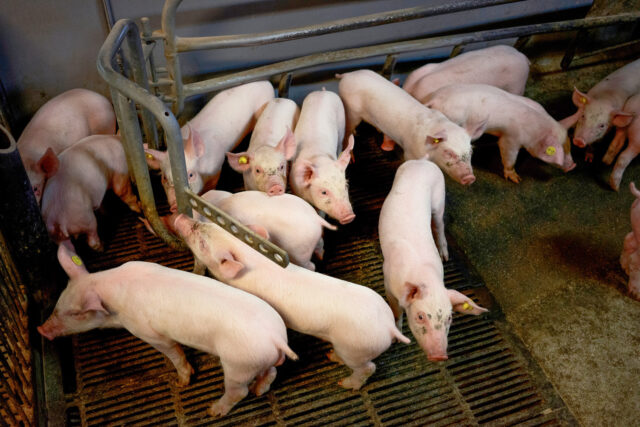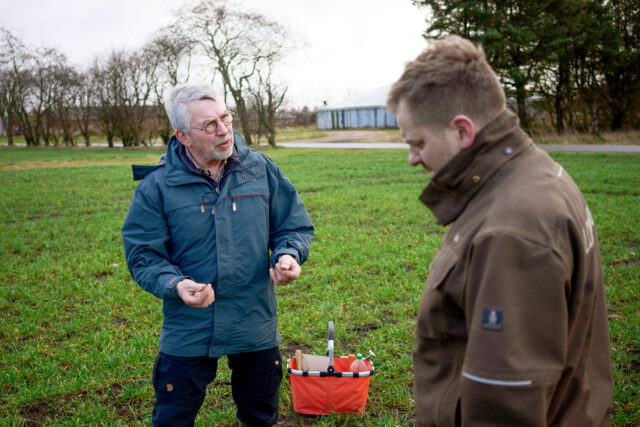Jacob Winther Nymand
Rye is a passion
Jacob Winther Nymand convinced Danish farmers to put rye in their pigs’ trough. His commitment fell on fertile ground at KWS.
Jacob Winther Nymand is convinced of rye – not only for human feed, but also as fodder.
Jacob Winther Nymand smiles when he says: “In my family, I guess I’m the rye nerd who thinks about nothing but rye. There’s some truth to that. I'm the one who bakes the rye bread at home, and I’m constantly thinking about what else rye could be used for. Yes, rye is omnipresent in my life.”
Jacob Winther Nymand, who is now Agro Service Manager KWS Scandinavia, not only has this reputation as a rye lover in his family – it preceded him even before he started at KWS. Claus Heuer, Product Manager at KWS Cereals in Wohlde, heard about 12 years ago about a consultant who was fervently trying to convince farmers south of Aarhus in Denmark to use rye as feed. “That consultant was me,” says Jacob Winther Nymand.
“I’ve always been convinced of rye.”
Jacob Winther Nymand
And his passion for rye goes back even further: He began testing new hybrid rye varieties, including seed from KWS, in 2006/2007. At the time, the Dane was working as a farm advisor at the Danish Agricultural Advisory Service (DAAS), a partnership that is directly owned by farmers.
Among other things, he was responsible there for recommending feeding plans for pig fattening – an important part of Danish farming. Jacob Winther Nymand saw rye as an important option in fodder for ensuring farms had a strong economic footing: In his field trials, hybrid rye produced far higher yields than conventional rye, and when KWS also got to grips with the problem of ergot with its PollenPlus technology, the consultant not only aroused farmers’ interest in rye for pig fattening, but also KWS’ interest in him as a person.

Rye in feed has been shown to make pigs satiated for longer, calmer and healthier.
The focus: plant production for feed
Finally, in 2013, KWS advertised a position that was made for Jacob Winther Nymand: “Working as an agricultural advisor with a focus on plant production for fodder gave me the opportunity to collaborate something I was keenly interested in: hybrid rye as feed.” And, as in his previous job, the trust of farmers was also an appealing factor: “KWS’ strength is its credibility as a family-run company.” Whereas Jacob Winther Nymand used to advise farmers on their own behalf, from now on he did so on behalf of KWS, but still enjoying their trust that his prime concern was to help deliver higher yields for farms.
In the first three years, Jacob Winther Nymand was the feed expert responsible for Russia, Ukraine, Belarus and Eastern Europe. Meanwhile, there were research results from Denmark on the subject of rye as feed. They proved that pigs with rye in their rations stay satiated for longer, behave more calmly as a result and are also healthier.
Video
“Less nitrogen”
Jacob Winther Nymand explains in the video why rye in pig feed is also advantageous for sustainability reasons. |
However, the organizational form of the mostly large farms in Russia made it difficult to persuade them: “They don’t look at the big picture from production to feeding to meat production, but consider each part independently. And successful proof from Denmark doesn’t mean it’s simply accepted at face value in these countries.”
That’s also what happened to him in the U.S. and Canada, where he started all over again, so to speak, from the end of 2016. Jacob Winther Nymand used existing contacts with the University of Illinois – one of the best in the world in terms of research into pig production, as he says. Scientifically monitored trials were conducted from 2017 to 2021 – with similar results to their Danish precursors. In the meantime, a government-funded project had also been launched in Germany and would ultimately deliver scientific confirmation of all of the trial results (see also "The super feed rye"). In the wake of the trials in the U.S., KWS set up a new local unit for hybrid rye.
Successful persuasion
“I’ve always been convinced of rye because it’s healthier than other cereals,” says Jacob Winther Nymand. There had been plenty of studies on rye in human nutrition. “All these research results can be applied to animals which, like humans, have only one stomach.” He adds that the trials, which commenced in 2017, have caused a big stir. “Now farmers are aware that they can feed their pigs rye instead of wheat.”
There are thus good arguments for rye in animal feed. However, the cereal still has a reputation for only thriving on sandy soils where nothing else grows. “My goal is to get the crop into the better soils as well.” In terms of regionality, too, he says it makes sense to expand cultivation so that the feed is grown directly where it will later end up in the trough. With regard to Denmark, he notes that the area used to cultivate hybrid rye has increased from 50,000 to 120,000 hectares solely because of its being grown for fodder – and there’s still further upward potential.

Jacob Winther Nymand uses data from a farm to demonstrate the carbon efficiency of rye.
Since the beginning of 2022, Jacob Winther Nymand has again been responsible for his old place of work: As Agro Service Manager for Food/Feed in Scandinavia and the Baltic States, he is also in charge of Denmark. In this position, he is in direct dialog with farmers as well as with agricultural consultants from the fields of cultivation and pig feeding – in other words, with his colleagues from the past. His latest project aims to demonstrate the benefits of rye in reducing CO2 emissions.
It was entirely unforeseeable that Jacob Winther Nymand’s life would turn out this way, even taking him to Mozambique as a consultant after his studies and ultimately making him a true ambassador for rye. As the eldest son, he was actually supposed to take over his parents’ farm; he had already completed his agricultural training. But during his military service, he decided to study agricultural science.
The farm was finally taken over by his younger brother Claus Winther Nymand in 1991, but only for six years before he sold it and himself went on to study – and started working as a plant specialist at Lochow-Petkus, now KWS LOCHOW, in 2004. He was responsible for various tasks in Northern and Eastern Europe as well as South and North America – including setting up the hybrid rye unit in the U.S. starting in 2017. He has been Sales Manager KWS Scandinavia since 2022.
The passion for rye seems to run in the family. |
This article is from insideKWS, the employee magazine of KWS. If you are an employee of our company, you have access to all other articles and previous issues.
© KWS SAAT SE & Co. KGaA 2025